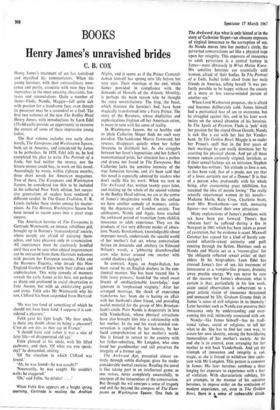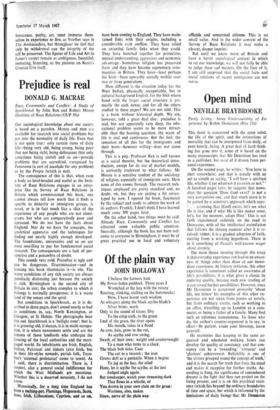Henry James's unravished brides BOOKS
C. B. COX
Henry James's treatment of sex has tantalised and mystified his commentators. When his young heroines, with their extraordinary inno- cence and purity, associate with men they lose themselves in the most amazing obsessions, fan- tasies and renunciations. Quite a number of them—Fleda, Nanda, Maggie—fall quite sick with passion for a handsome face, even though its possessor may be a scoundrel or a fool The first two volumes of the new The Bodley Head Henry lames, with introductions by Leon Edel (37s 6d each) provide an opportunity to examine the careers of some of these impressive young ladies.
The first volume includes two early short novels, The Europeans and Washington Square, both set in America, and considered by James to be potboilers. In 1878, Edel tells us, he had completed his plan to write The Portrait of a Lady, but had neither the money, nor the leisure money could buy, to work on this novel. Accordingly he wrote, within eighteen months, three short novels for American magazines. Two of these, The Europeans and Washington Square, he considered too thin to be included in his collected New York edition, but succes- sive generations of readers have rendered a different verdict. In The Great Tradition, F. R. Leavis includes these stories among his master- pieces. As The Heiress, Washington Square has been turned in recent years into a great stage success.
The American heroine of The Europeans is Gertrude Wentworth, an intense, rebellious girl, brought up in Boston's 'transcendental' society, where people are afraid of enjoying them- selves, and take pleasure only in renunciation. All experiences must be cautiously handled until they can be sure what ethical improvement can be extracted from them. Gertrude welcomes with passion her European cousins, Felix and the Baroness Eugenia, who invade this New England Garden of Eden with their culture and sophistication. This witty comedy of manners reveals the early James at his best, not perhaps as sharp and profound in social observation as Jane Austen, but with an exhilarating gaiety and irony. Felix asks Mr Wentworth why his son, Clifford has been suspended from Harvard: 'He was too fond of something of which he should not have been fond. I suppose it is con- sidered a pleasure.'
Felix gave his light laugh. 'My dear uncle, is there any doubt about its being a pleasure? C'est de son age, as they say in France.'
'I should have said rather it was a vice of later life—of disappointed old age.'
Felix glanced at his uncle, with his lifted eyebrows, and then, 'Of what are you speak- ing?' he demanded, smiling.
'Of the situation in which Clifford was found.'
'Ah, he was found—he was caught?'
'Necessarily, he was caught. He couldn't walk; he staggered.'
'Oh,' said Felix; 'he drinks! . .
When Felix first appears on a bright spring morning, Gertrude is reading the Arabian
Nights, and it seems as if the Prince Camaral- zaman himself has sprung into life before her very eyes. Their marriage at the end, which James provided in compliance with the demands of Howells of the Atlantic Monthly, is perhaps the main reason why he thought the story unsatisfactory. The frog, the beast, which threaten the heroine's bed, have been magically transformed into a Fairy Prince. The story of the Baroness, whose duplicities and sophistications frighten off her American suitor, is more in tune with his sense of reality.
In Washington Square, the so healthy and so plain Catherine Sloper finds no such easy paradise. The handsome Morris Townsend, her rescuer, disappears quietly when her father threatens to disinherit her. As she struggles between her lover's hypocrisies and her father's monomaniacal pride, her situation has a pathos and drama not found in The Europeans. But Catherine lacks the sensitive intensity of the true Jamesian heroine, and it's been said that this novel is especially admired by readers who don't really like his work. When we turn to The Awkward Age, written twenty years later, and making up the whole of the second volume in the Bodley Head edition, we are at the centre of James's imaginative world. On the surface we have another comedy of manners, satiris- ing the degeneracy of London society. Two adolescents, Nanda and Aggie, have reached the awkward period of transition from childish innocence to adult experience. They are the products of two very different modes of educa- tion. Nanda Brookenham, knowledgeable about improper novels, understands the squalid world of her mother's fast set, whose conversation thrives on innuendo and adultery (in Edmund Wilson's words, a 'gibbering disembowelled crew who hover around one another with sordid shadowy designs').
In contrast, Aggie, an Anglo-Italian, has been raised by an English duchess in the con- tinental manner. She has been treated like 'a little ivory princess,' hand-fed 'the small sweet biscuit of unobjectionable knowledge,' kept ignorant in 'emphasised virginity.' After her arranged marriage, the shock of experience transforms her. Soon she is having an affair with her husband's close friend, and providing useful material for the gossip of Mrs Brooken- ham's circle. Poor Nanda is desperately in love with Vanderbank, whose physical attractions have also brought him into a relationship with her mother. In the end his weak-minded con- servatism is repelled by her honesty, by her lucid comprehension of her mother's world. She is forced to retreat to the country with her father-substitute, Mr Longdon, who once loved her grandmother and still preserves the integrity of a former age.
The Awkward Age, presented almost en- tirely through subtle dialogue, gives the reader considerable mental exercise. Reading the novel is like taking part in an intellectual game, as one strives, never completely successfully, to interpret all the innuendoes of the conversation. But through the wit emerges a sense of tragedy and evil far beyond the compass of The Euro- peans or Washington Square. One feels in The Awkward Age what is only hinted at in the story of Catherine Sloper—an obscene exposure of virginal innocence to the corruption of sex. As Nanda moves into her mother's circle, the perverted conversations act like a physical rape upon her integrity. This exposure of innocence to adult perversion is a central fantasy in James—most obviously in What Maisie Knew. His sensitive heroines are essentially cold women, afraid of their bodies. In The Portrait of a Lady, Isabel holds aloof from her male friends in America, telling herself 'it was per- fectly possible to be happy without the society of a more or less coarse-minded person of another sex.'
When Lord Warburton proposes, she is afraid and becomes deliberately cold. James himself had a puritanical fear of sex to overcome, but he struggled against this, and in his later work insists on the sexual abandon of his heroines. In The Spoils of Poynton, Fleda is 'pale' with her passion for the stupid Owen Gereth; Nanda is sick like a cat with her lust for Vander- bank. In The Golden Bowl, Maggie is so under her Prince's spell that in the first years of their marriage he can easily dominate her by asserting his physical charm. And yet all these women remain curiously virginal, inviolate, as if their sexual feelings are an intrusion. Stephen Spender has written : 'his attitude to love is not, as has been said, that of a prude, nor yet that of a lover, certainly not of a Donne! It is that of a person who, profoundly with his whole being, after overcoming great inhibition, has accepted the idea of people loving.' The really sexually experienced women in his novels— Madame Merle, Kate Croy, Charlotte Stant, even Mrs Brookenham—are rich, menacing figures—not without their own attraction.
Many explanations of James's problems with sex have been put forward. There's that 'obscure hurt' he suffered during a fire in Newport in 1861 which has been taken as proof of castration, but the evidence is scant. Maxwell Geismar has argued for a kind of barely con- cealed infantile-sexual curiosity and guilt running through the fiction. Heroines such as Nanda and Maisie act as a 'voyeur-glass' for 'the obliquely reflected sexual antics' of their elders. In his biographies, Leon Edel has stressed James's fear of sex, his treatment of intercourse as a vampire-like process, draining away psychic energy. We can never be sure of the reasons for James's obsession; what is certain is that, particularly in his late work, acute social observation is subservient to a great artistic vision of innocence threatened and menaced by life. Graham Greene finds in James 'a sense of evil religious in its intensity.' Later heroines such as Nanda can preserve their innocence only by understanding and over- coming this evil, intimately associated with sex.
Nanda—like James himself—has no tradi- tional values, social or religious, to tell her what to do. She has to find her own way, to create her own identity, among the bewildering immoralities of her mother's society. At the end she is in control, even arranging for her mother to win back Vanderbank. And yet the triumph of innocence and integrity is sad, tragic, as she is forced to withdraw into seclu- sion with Mr Longdon. This pattern is common in James. His later heroines combine a deep longing for exposure to experience with a fear of violation. With characteristic subtlety, his art attempts, in the manner of his sensitive heroines, to impose order on the confusion of modern experience, yet, even in The Golden Bowl, there is a sense of unbearable strain. Innocence, purity, art, must immerse them- selves in experience to live, as Strether says in The Ambassadors, but throughout we feel that only by withdrawal can the integrity of the self be preserved. The figures of Life and Art in James's carpet remain as ambiguous, beautiful, menacing, haunting, 'as the pictures on Keats's Grecian Urn itself.































 Previous page
Previous page